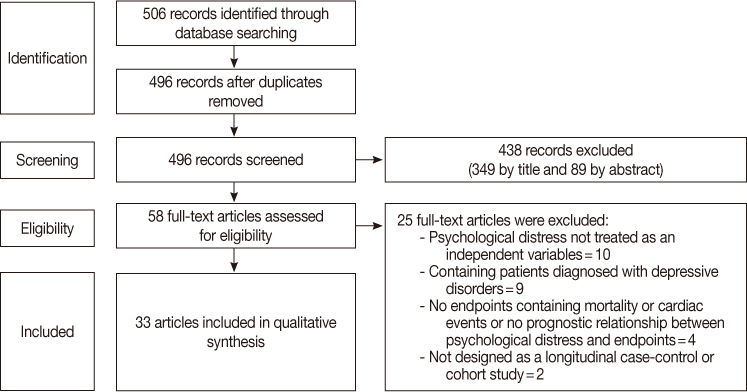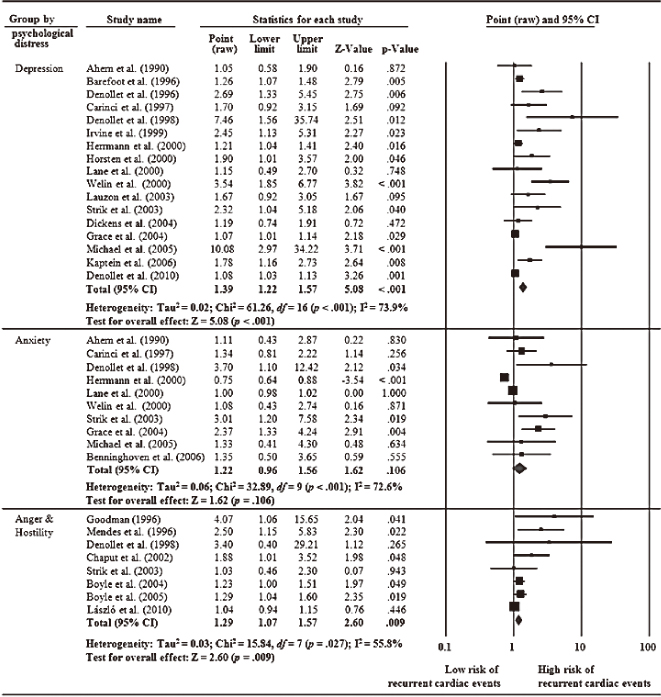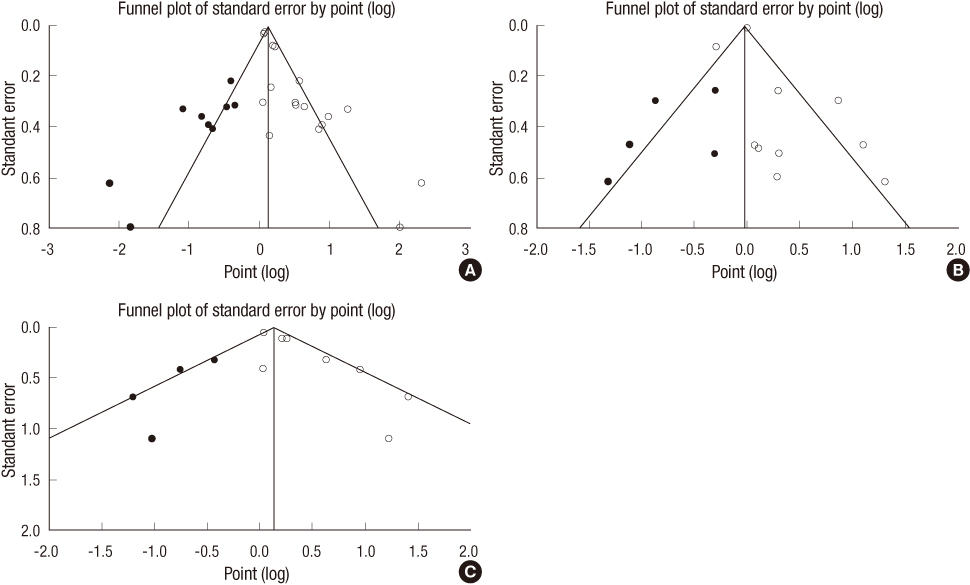J Korean Acad Nurs.
2011 Oct;41(5):704-714. 10.4040/jkan.2011.41.5.704.
A Systematic Review of Psychological Distress as a Risk Factor for Recurrent Cardiac Events in Patients with Coronary Artery Disease
- Affiliations
-
- 1College of Nursing, Ajou University, Suwon, Korea.
- 2College of Nursing, Yonsei University, Seoul, Korea. baega7695@hanmail.net
- KMID: 1031109
- DOI: http://doi.org/10.4040/jkan.2011.41.5.704
Abstract
- PURPOSE
The purpose of this study was to determine whether psychological distress is an independent risk factor for recurrent cardiac events in patients with coronary artery disease (CAD).
METHODS
A prospective cohort of studies that measured psychological distress and the incidence of recurrent cardiac events in the adult population were included. Three computerized databases were assessed (PubMed, CINAHL, and PSYCINFO). Meta-analysis was conducted using a random-effects model to determine summary estimates of risks of major recurrent cardiac events associated with each psychological distress. Of 506 publications identified, 33 met inclusion criteria, and 24 studies were used to estimate effect size of psychological distress on recurrent cardiac events.
RESULTS
Mean number in the research sample was 736 and mean time of follow-up was 4.0 years. Depression, anxiety, anger, and hostility as psychological factors were studied. According to estimation of effect size using random model effect, depression (OR=1.39, 95% CI: 1.22-1.57), anxiety (OR=1.22, 95% CI: 0.96-1.56), and anger/hostility (OR=1.29, 95% CI: 1.07-1.57) CAD patients in significantly increased risk for recurrent cardiac events.
CONCLUSION
Finding suggests that psychological distress in forms of depression, anxiety, anger, and hostility impact unfavorably on recurrent cardiac events in CAD patients.
MeSH Terms
Figure
Cited by 3 articles
-
Stress and cardiovascular disease
Jung Jin Cho
J Korean Med Assoc. 2013;56(6):462-470. doi: 10.5124/jkma.2013.56.6.462.Influencing Effects of Type D Personality on Symptom Experiences and Quality of Life in Patients with Percutaneous Coronary Intervention
Eun Hee Jo, Sun Hee Han, Myung Ha Lee, Sung Reul Kim
Korean J Adult Nurs. 2016;28(5):536-545. doi: 10.7469/kjan.2016.28.5.536.Impact of Type D Personality on Depression, Anxiety, and Health-related Quality of Life among Coronary Artery Disease Patients: A Systematic Review and Meta-analysis
Sun Hyoung Bae, Jin-Hee Park
Korean J Adult Nurs. 2019;31(3):219-234. doi: 10.7475/kjan.2019.31.3.219.
Reference
-
1. Allison TG, Williams DE, Miller TD, Patten CA, Bailey KR, Squires RW, et al. Medical and economic costs of psychologic distress in patients with coronary artery disease. Mayo Clinic Proceedings. 1995. 70:734–742. doi: 10.4065/70.8.734.2. Barlow DH. Anxiety and its disorders. 2002. 2nd ed. New York, NY: Guilford.3. Barth J, Schumacher M, Herrmann-Lingen C. Depression as a risk factor for mortality in patients with coronary heart disease: A meta-analysis. Psychosomatic Medicine. 2004. 66:802–813. doi: 10.1097/01.psy.0000146332.53619.b2.4. Chida Y, Steptoe A. The association of anger and hostility with future coronary heart disease: A meta-analytic review of prospective evidence. Journal of the American College of Cardiology. 2009. 53:936–946. doi: 10.1016/j.jacc.2008.11.044.5. de Jonge P, Ormel J, van den Brink RH, van Melle JP, Spijkerman TA, Kuijper A, et al. Symptom dimensions of depression following myocardial infarction and their relationship with somatic health status and cardiovascular prognosis. The American Journal of Psychiatry. 2006. 163:138–144. doi: 10.1176/appi.ajp.163.1.138.6. Denollet J, Gidron Y, Vrints CJ, Conraads VM. Anger, suppressed anger, and risk of adverse events in patients with coronary artery disease. American Journal of Cardiology. 2010. 105:1555–1560. doi: 10.1016/j.amjcard.2010.01.015.7. DerSimonian R, Laird N. Meta-analysis in clinical trials. Controlled Clinical Trials. 1986. 7:177–188. doi: 10.1016/0197-2456(86)90046-2.8. Egger M, Davey Smith G, Schneider M, Minder C. Bias in meta-analysis detected by a simple, graphical test. British Medical Journal. 1997. 315:629–634.9. Egger M, Smith GD, Altman DG. Systematic reviews of observational studies in Systematic Reviews in Health Care: Meta-Analysis in Context. 2001. 2nd ed. London: BMJ Books.10. Everson-Rose SA, Lewis TT. Psychosocial factors and cardiovascular diseases. Annual Review of Public Health. 2005. 26:469–500. doi: 10.1146/annurev.publhealth.26.021304.144542.11. Frasure-Smith N, Lesperance F. Depression and other psychological risks following myocardial infarction. Archives of General Psychiatry. 2003. 60:627–636. doi: 10.1001/archpsyc.60.6.627.12. Gorkin L, Schron EB, Brooks MM, Wiklund I, Kellen J, Verter J, et al. Psychosocial predictors of mortality in the Cardiac Arrhythmia Suppression Trial-1 (CAST-1). American Journal of Cardiology. 1993. 71:263–267. doi: 10.1016/0002-9149(93)90788-E.13. Higgins JP, Thompson SG, Deeks JJ, Altman DG. Measuring inconsistency in meta-analyses. British Medical Journal. 2003. 327:557–560. doi: 10.1136/bmj.327.7414.557.14. Hopkins WG. An introduction to meta-analysis. Sportscience. 2004. 8:20–24.15. Kent LK, Shapiro PA. Depression and related psychological factors in heart disease. Harvard Review of Psychiatry. 2009. 17:377–388. doi: 10.3109/10673220903463333.16. Lemesle G, Sudre A, Modine T, Delhaye C, Rosey G, Gourlay T, et al. High incidence of recurrent in stent thrombosis after successful treatment of a first in stent thrombosis. Catheterization and Cardiovascular Interventions. 2008. 72:470–478. doi: 10.1002/ccd.21709.17. Leroy M, Loas G, Perez-Diaz F. Anhedonia as predictor of clinical events after acute coronary syndromes: A 3-year prospective study. Comprehensive Psychiatry. 2009. 51(1):8–14. doi: 10.1016/j.comppsych.2009.01.011.18. Lim ST. Assessment of prognosis and risk stratification in coronary artery disease. Nuclear Medicine and Molecular Imaging. 2009. 43:222–228.19. Martens EJ, Hoen PW, Mittelhaeuser M, de Jonge P, Denollet J. Symptom dimensions of post-myocardial infarction depression, disease severity and cardiac prognosis. Psychological Medicine. 2010. 40:807–814. doi: 10.1017/S0033291709990997.20. Mayou RA, Gill DM, Thompson DR, Hicks N, Volmink J, Neil A. Depression and anxiety as predictors of outcome after myocardial infarction. Psychosomatic Medicine. 2000. 62:212–219. doi: 10.1017/S0033291709990997.21. McCabe PJ. Psychological distress in patients diagnosed with atrial fibrillation: The state of the science. Journal of Cardiovascular Nursing. 2010. 25:40–51. doi: 10.1097/JCN.0b013e3181b7be36.22. Pedersen SS, Denollet J, de Jonge P, Simsek C, Serruys PW, van Domburg RT. Brief depression screening with the PHQ-2 associated with prognosis following percutaneous coronary intervention with paclitaxel-eluting stenting. Journal of General Internal Medicine. 2009. 24:1037–1042. doi: 10.1007/s11606-009-1054-1.23. Ridner SH. Psychological distress: Concept analysis. Journal of Advanced Nursing. 2004. 45:536–545. doi: 10.1046/j.1365-2648.2003.02938.x.24. Roest AM, Martens EJ, Denollet J, de Jonge P. Prognostic association of anxiety post myocardial infarction with mortality and new cardiac events: A meta-analysis. Psychosomatic Medicine. 2010. 72:563–569. doi: 10.1097/PSY.0b013e3181dbff97.25. Sirois BC, Sears SF Jr, Bertolet B. Biomedical and psychosocial predictors of anginal frequency in patients following angioplasty with and without coronary stenting. Journal of Behavioral Medicine. 2003. 26:535–551. doi: 10.1023/A:1026201818892.26. Smith SC Jr, Allen J, Blair SN, Bonow RO, Brass LM, Fonarow GC, et al. AHA/ACC guidelines for secondary prevention for patients with coronary and other atherosclerotic vascular disease: 2006 update. Circulation. 2006. 113:2363–2372. doi: 10.1161/CIRCULATIONAHA.106.174516.27. Song EK, Son YJ, Lennie TA. Trait anger, hostility, serum homocysteine, and recurrent cardiac events after percutaneous coronary interventions. American Journal of Critical Care. 2009. 18:554–561. doi: 10.4037/ajcc2009974.28. Thune JJ, Signorovitch JE, Kober L, McMurray JJ, Swedberg K, Rouleau J, et al. Predictors and prognostic impact of recurrent myocardial infarction in patients with left ventricular dysfunction, heart failure, or both following a first myocardial infarction. European Journal of Heart Failure. 2011. 13:148–153. doi: 10.1093/eurjhf/hfq194.29. Ziegelstein RC, Thombs BD, Coyne JC, de Jonge P. Routine screening for depression in patients with coronary heart disease, never mind. Journal of the American College of Cardiology. 2009. 54:886–890. doi: 10.1016/j.jacc.2009.01.082.
- Full Text Links
- Actions
-
Cited
- CITED
-
- Close
- Share
- Similar articles
-
- The Analysis of Risk Factor Management Programs for Patients with Coronary Artery Disease
- Carotid ultrasound in patients with coronary artery disease
- Imaging Findings of Coronary Artery Fistula in Children: A Pictorial Review
- Anomalous Origin of the Coronary Artery from the Pulmonary Artery in Children and Adults: A Pictorial Review of Cardiac Imaging Findings
- Long-term Influence of Mild to Moderate Ischemic Mitral Regurgitation after Off-pump Coronary Artery Bypass Surgery




